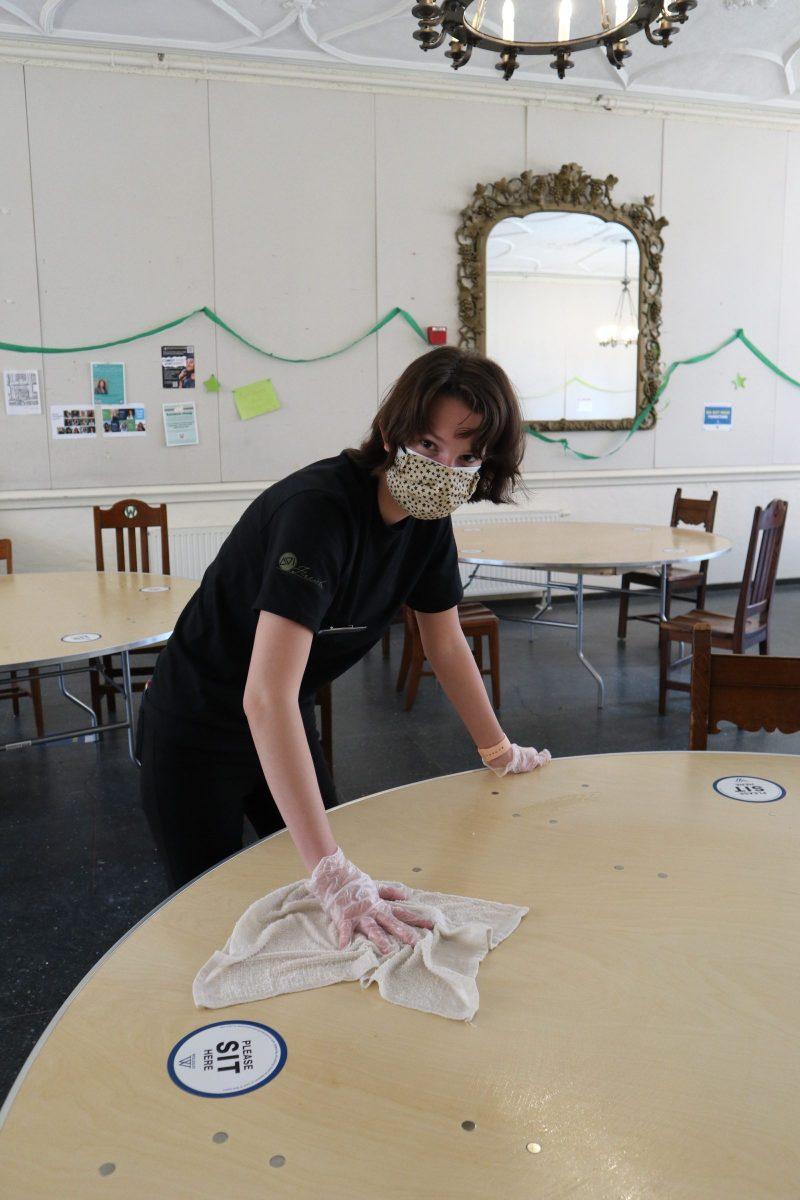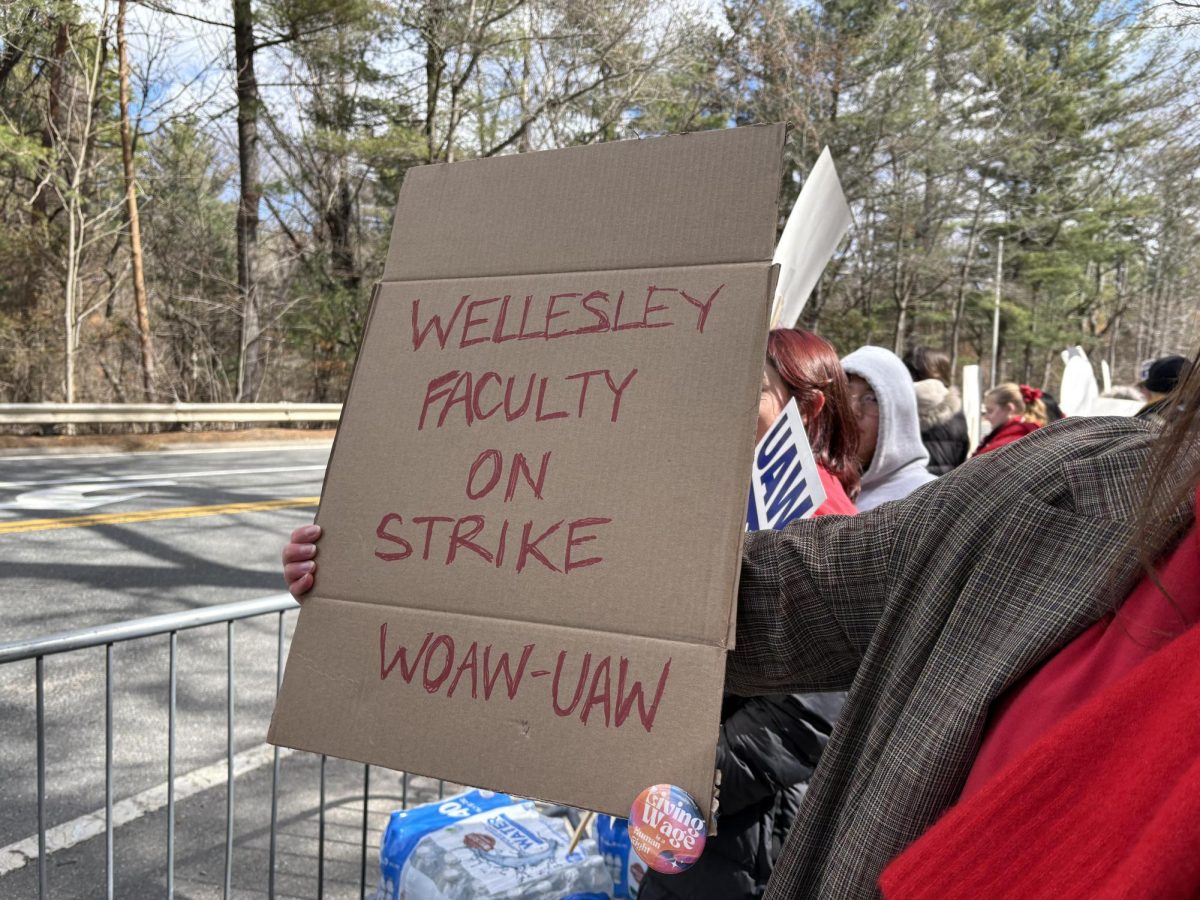Respecting Essential Workers
Kate Pittignano ’24 began working in Tower Dining Hall as a dining hall community ambassador at the beginning of the 2020-2021 school year. Pittignano is responsible for disinfecting dining hall tables each time they are used during meal times. Recently, she has grown concerned about her risk of exposure and the safety of the Wellesley community, as this semester’s dining policies have caused a drastic increase in the number of students eating in the dining hall during meal times. Wellesley guidelines now stipulate that students must eat meals only in dining halls or dorm rooms, and because only three dining halls are open, according to Pittignano, Tower Dining Hall has been filled to maximum capacity during many meal times. The number of students in the dining hall fluctuates, but it peaks during certain meal times, especially dinner.
“There are days when every single table is full, and it’s honestly scary to be in there,” said Pittignano.
Three times each week, twice during dinner and once during lunch, Pittignano disinfects all the dining hall tables on either side of the large hall, and she finds it difficult to physically distance as she moves about the room. In the midst of crowds, she is exposed to aerosols for up to two hours during her shifts. Pittignano discovered her position as a part of the Wellesley work-study program. When asked how the College could support her efforts to work, Pittignano stated that the College could reduce crowding in the dining halls, either by lifting the policy limiting the areas in which people are permitted to eat or by creating additional seating areas. While the new dining policy was designed to promote community safety, Pittignano questioned its effectiveness, calling dinner shifts “intense.”
“In those moments, I really question the decision to say ‘only eat in the dining halls,’ Pittignano said. “There just isn’t the capacity.”
And while Pittignano believes that the issue of overcrowding can be solved and has generally felt respected and supported by the Wellesley community, she has experienced more unfriendly encounters while working in the dining hall than anywhere else on campus.
You really don’t care about me at all?
Caroline Francois ’23 worked in Wellesley as a Starbucks employee during 2020 shared a similar experience. She was struck by the lack of consideration shown for service workers by people who were able to wear masks but chose not to in their interactions with employees.
“You really don’t care about me at all?” Francois asked rhetorically.
Gabi Leovan ’23 believes that respect for service workers must be expressed structurally. As an employee of Jimmy John’s in Minnesota, Leovan’s risk of exposure is dependent on state guidelines determining dining policies. In addition, during and before the pandemic, Leovan has worked many jobs alongside other service workers, working part-time during the school year and longer hours during breaks. She does not believe that United States legislation has gone far enough in protecting the wellbeing of service workers.
“When I think about appreciating essential workers, I see it as paying them a living wage, making sure they have accurate insurance, accurate benefits …” Leovan said, adding that many of her coworkers rely on service jobs for security and have received limited wages and benefits.
Students Working During the Pandemic
For many Wellesley students working off campus, work demands have increased during the pandemic. Many positions are understandably understaffed, and due to health protocols, employees are tasked with new responsibilities. As a shift manager, Leovan is responsible for disinfecting store surfaces while also preparing food, managing other employees and serving customers. Often, she has been asked to serve long lines of customers alone. Francois too became responsible for disinfection at her Starbucks franchise in addition to serving customers, and she was often needed for shifts, expanding her work schedule, which already included her responsibilities as a residential assistant and as a staff member of the Child Study Center.
I don’t think anyone at work feels like a hero right now.
Ella Rockart ’23 works as a part-time employee of the Carolina Living and Learning Center, a residential facility in North Carolina that serves adults with autism and adults with intellectual disabilities. Rockart enjoys her work and looks forward to seeing residents every day, but she and the other employees of the CLLC have also experienced challenges as a result of COVID-19. The facility is understaffed, leaving employees stretched thin, and the staff is often frustrated that they cannot provide a typical routine to residents due to safety protocols. Residents can no longer receive visitors, and regular activities have been modified.
“I don’t think anyone at work feels like a hero right now. People are tired. People are frustrated. But also, people are grateful to have the jobs,” Rockart said.
Working as a Student
During the school year, Rockart, Pittignano, Leovan and Francois have worked part-time hours while also taking classes, but each of their experiences have been distinct. For Rockart, work is flexible and a welcome opportunity to provide services at the CLLC that are immediately necessary to other people. Before she began working, when she was not in her dorm room knitting and watching Star Trek, Rockart was doing school work, and due to the pandemic, worrying about the future she was working towards.
“I felt like I was preparing for a future that no longer existed,” Rockart said.
Work has prompted Leovan and Francois to finish their school work efficiently. However, they have both faced challenges when managing their time at school. Leovan has sometimes found it difficult to complete school work on time as a result of her work hours, and Francois has felt isolated, as it can be difficult to find time to spend with friends while fulfilling her work and school responsibilities. Pittignano and Aliyana Young ’24 find it easier to balance their time, as their work-study jobs offer limited hours. Young described her ability to work part-time while taking classes as a privilege for which she is grateful. However, Young believes that students would benefit from more outreach from the College about how to find work-study jobs.
As a first-year, Young was told that she was eligible to find a work-study job on Handshake, but she did not know what Handshake was or how to use it. When she asked other students about Handshake, she discovered that many students had trouble finding on-campus jobs.
“It was that aspect [of finding jobs] that was difficult … just getting thrown into it and not really having much support,” Young said.
Since the end of Fall 2020, the Wellesley COVID-19 guidelines have prevented students living on campus from working off campus. Francois had begun working off campus to supplement her income, as on-campus jobs offer limited hours, but had to leave her job at Starbucks in order to continue living on campus. In 2020, a statement from the office of Finance and Administration and from Admission and Financial Aid acknowledged that policies regulating off-campus employment have financial implications for students and have generated more demand for on-campus employment. In response, the College replaced Spring 2021 work-study expectations with grant aid in student financial aid packages.
I felt like I was preparing for a future that no longer existed.
Leovan has continued to work off campus, as she is living in Minnesota. She believes that the College could more openly acknowledge the unique challenges faced by students who work while taking classes.
“I just know that it’s something they never address, and it’s something that should be addressed because it is hard, and especially in the term system …” Leovan said.
Leovan acknowledged that the College is making changes to student employment procedures. Human Resources announced this spring that beginning Fall 2021, Student Employment will be managed by Human Resources, rather than Student Financial Services, and work-study positions and applications will be posted on Workday.
During the COVID-19 pandemic, health concerns and protocols influence the experiences of Wellesley students working in-person jobs. Individuals experience risks to different extents, and risks and challenges are imposed on frontline workers whose work nevertheless continues to bolster communities. Individual students’ work experiences reveal new challenges, as well as opportunities for communities to express respect and consideration for frontline service workers.







Gracemarie Kunkel | May 10, 2021 at 11:15 am
A sensitive and thorough examination of the “Essential Worker” labor culture. I spent 22 years of my life as a food handler. Believe me, it is a being of filth–both the physical positioning and the social positioning
If you should remember to say “thank you”, please mean it.